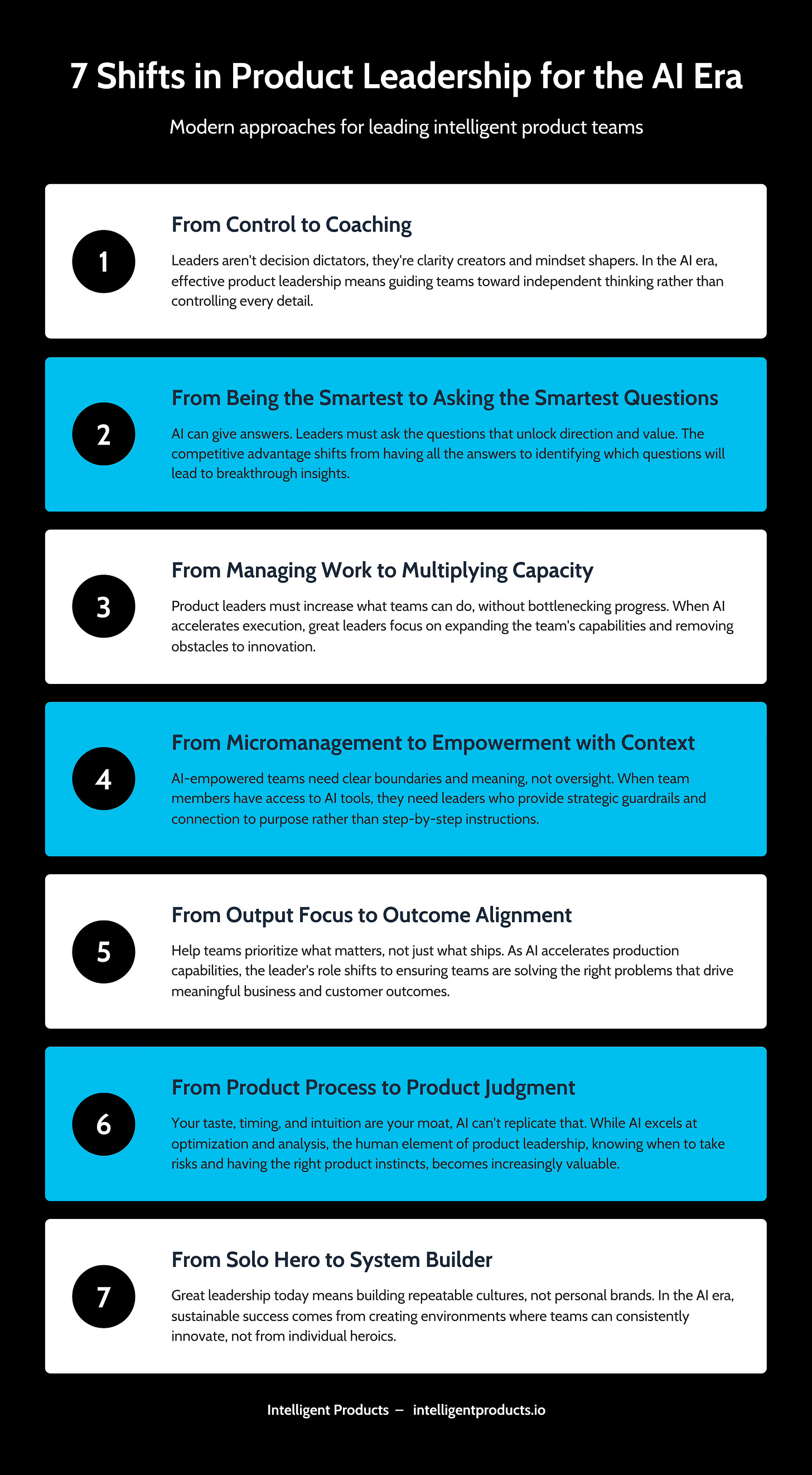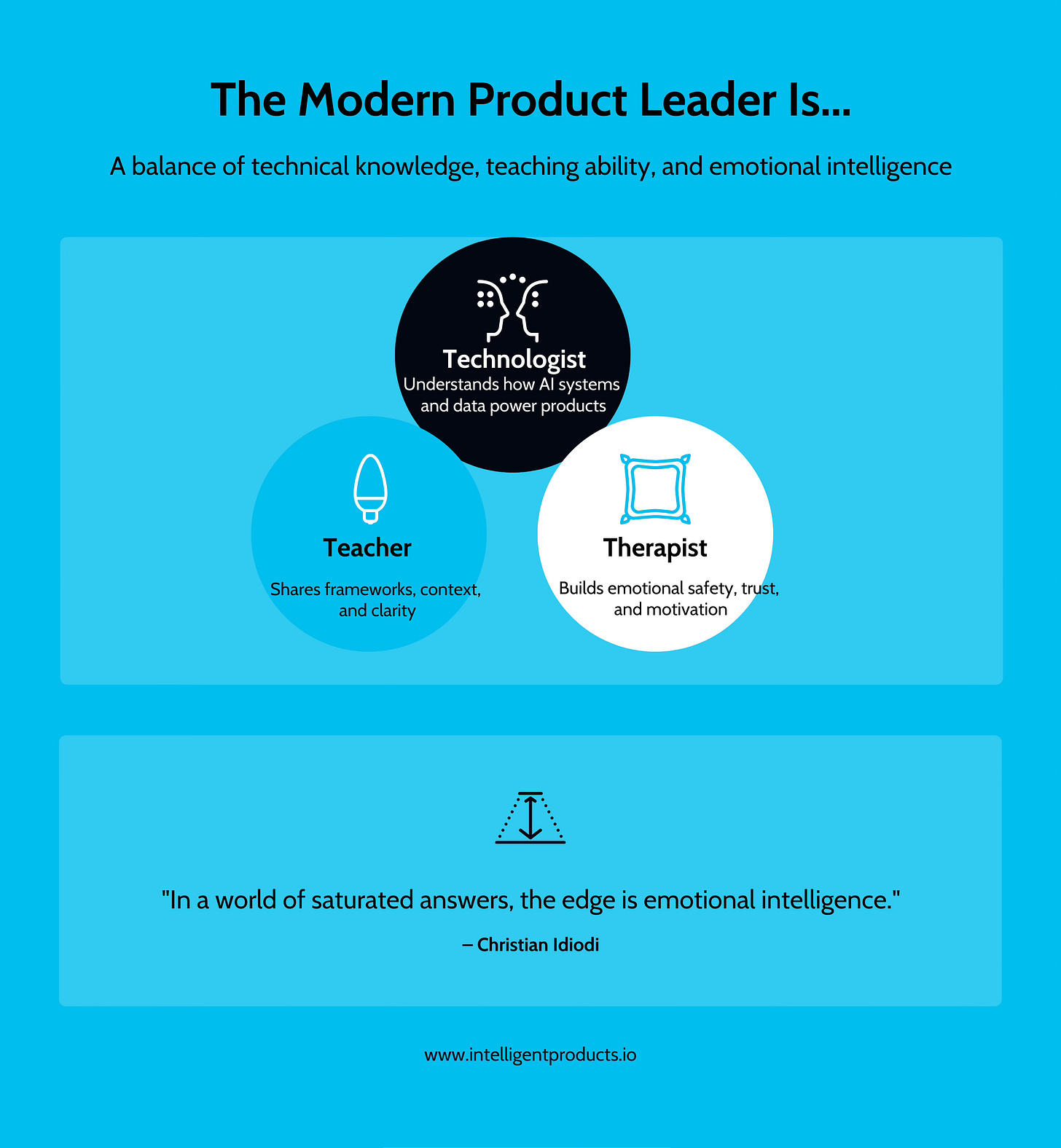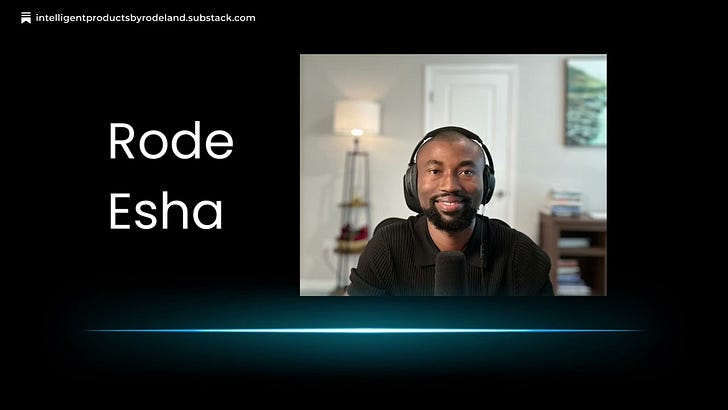Let’s get honest. AI is getting better. Faster. Smarter.
But here’s what it can’t do:
Coach a team through doubt and with empathy.
See patterns before the data says so.
Make the human call when everything’s on the line.
That’s where leadership still wins.
And that’s what today’s episode is all about.
What We Talked About
This week, I sat down with Christian Idiodi, Partner at Silicon Valley Product Group (SVPG) and host of the Product Therapy podcast.
Christian has coached thousands of product managers around the world. But this conversation wasn’t just about frameworks, it was about what product leadership actually looks like in 2025 and beyond.
We explored:
What’s changing in product leadership with AI
What execs really want from product managers today
How to lead both humans and AI systems
Why product sense is still your moat
How Christian helps teams build trust, clarity, and confidence in an era of overload
This episode is packed with practical advice, deep insight, and clarity for any PM, leader, or organizations trying to stay sharp in a shifting landscape.
What You’ll Learn
Here are 5 fast takeaways:
AI can inform, but not replace, leadership.
Coaching is more powerful than controlling.
Great PMs drive clarity, not just delivery.
Executive trust comes from repeatable decision-making.
Empowered teams need emotionally intelligent leaders.
One Powerful Quote
“I can’t teach you to be curious. But I can show you how curiosity changes teams.”
– Christian Idiodi
Why This Matters
AI is everywhere, copilots, agents, dashboards, recommendations.
But leadership is still earned, not automated.
We’re entering a new reality where:
Product managers aren’t just shipping features, they’re shaping intelligence and outcomes.
Teams are working with agents, not just engineers.
Influence, empathy, and decision quality matter more than ever.
And if we’re not evolving how we lead, we’re falling behind.
Christian’s perspective reminds us that the future of product isn’t just AI-driven. It’s human-led, insight-powered, and built on trust.
Listen to the Full Episode
“AI Won’t Replace Great Leaders” with Christian Idiodi
🌐 More episodes → intelligentproducts.io
Connect with Christian
Podcast: Product Therapy
My Takeaways from Christian Idiodi
Why product leadership still matters more than ever, even in the age of AI
I went into this conversation with Christian expecting wisdom. What I didn’t expect was just how human and clear his perspective would be, especially at a time when most people are either glorifying AI or panicking about it.
Christian reminded me that we’re not replacing leadership. We’re rewriting it.
Not just because of what AI can do, but because of what we expect from teams, tools, and each other in this new world.
Here are the takeaways that hit the hardest for me:
1. Leadership doesn’t vanish in the AI era, it evolves
We talk a lot about AI replacing jobs. But Christian brought the conversation back to something deeper: AI won’t replace great leaders, but it will expose weak ones.
When AI handles repetitive tasks, automation, and even suggestions… what’s left?
Real leadership
Emotional intelligence
The ability to coach, to clarify, to challenge
To hold a team together when uncertainty strikes
The role of the product leader is shifting from being the smartest person in the room to being the one who can ask the right questions, create context, and remove friction.
In a world of endless inputs, the best leaders now serve as filters, not factories.
2. AI creates empowered teams, but that doesn’t mean directionless ones
One of my favorite parts of the conversation was when Christian described how AI is making teams feel more empowered. Everyone can now query a dataset, brainstorm in ChatGPT, or build something lightweight without waiting on leadership sign-off.
But he also warned: empowerment without clarity is chaos.
Just because your team has tools doesn’t mean they know what matters.
Just because your PMs have agents doesn’t mean they’re making good bets.
That’s where modern product leaders step in.
Not to micromanage, but to curate direction.
Christian said it best:
“Your team should never be unclear about what ‘good’ looks like.”
In other words, AI can help you move faster, but you still need someone pointing to the right North Star.
3. What executives are looking for from PMs is changing
This part really hit home for me, and I think it will for anyone building a product career today.
Christian didn’t sugarcoat it: PMs need to be more than delivery managers.
The job isn’t just writing requirements or tickets, attending standups, or feeding sprints.
Executives today are asking:
Can this PM make decisions without hand-holding?
Can they bring clarity to complex, fast-moving problems?
Can they work across business, design, data, and now AI systems?
Do they understand not just what we’re building, but why?
With AI generating more surface-level answers, what’s valuable is depth.
PMs who can simplify, focus, prioritize and most importantly, communicate.
Christian reminded me that the most valuable product managers now are not just builders. They’re translators, integrators, and coaches.
4. Coaching beats controlling, especially now
We touched on a subtle but powerful leadership theme: moving from control to coaching.
In traditional leadership, authority was often about making the final call. But in AI-powered teams, where everyone can spin up prototypes, test ideas, or gather feedback… what’s the leader’s role?
Christian put it like this:
“The role of the leader isn’t to answer. It’s to expand thinking.”
That means
Asking better questions.
Encouraging curiosity.
Creating an environment where mistakes are safe and where learning is constant.
It reminded me that great product leaders are not gatekeepers, they’re gardeners.
They build the soil, water the plants, prune when needed, but let the team grow.
And in AI-heavy environments, this coaching mindset becomes critical. Because your team may already have the tools, but what they still need is a mirror and a mentor.
5. The new playbook isn’t about control, it’s about capacity
This insight reframed a lot of how I think about product orgs.
Christian said something profound:
“Your job as a leader is to increase the capacity of your team, not their control.”
That’s the new bar.
Not how much work gets done under your watch.
But how much more your team can do, with confidence, clarity, and cohesion, because of your leadership.
He also talked about building leadership systems that are repeatable, not just reliant on personal charisma or heroic effort. That’s what scale demands. And that’s what the AI era amplifies.
If your team relies on you for every insight, every next step, every context handoff, AI won’t save you.
But if you’ve built a system that creates shared understanding and trust?
Then AI becomes fuel, not friction.
6. Product sense is still your moat
Despite all the hype around AI replacing everything, Christian made a powerful case for product sense as the new competitive advantage.
Not product process.
Not product documentation.
But product judgment. Taste. Timing. Context. Customer empathy.
Those are the things you still can’t outsource to a bot.
Those are the things that help you say no when the roadmap is packed.
That help you decide when to ship, when to iterate, and when to stop altogether.
Christian said:
“AI can help you see faster, but it can’t help you see better. That’s still your job.”
I’ll be sitting with that one for a while.
7. The best leaders in 2025 are part teacher, part therapist, part technologist
This might’ve been my favorite idea of the entire conversation.
The role of the modern product leader is becoming multi-dimensional:
You need the emotional awareness of a coach or therapist
The teaching ability to pass on knowledge and frameworks
And the technical fluency to know how AI, data, and systems work under the hood
That doesn’t mean you have to be perfect in all three.
But you have to know which hat to wear and when.
AI will make products smarter.
But it will make leaders more responsible and more exposed.
Final Reflection
This conversation reminded me that leadership isn’t going away.
In fact, in a world of AI saturation, the human edge becomes the differentiator.
Who can lead with empathy?
Who can guide teams through complexity?
Who can sense the right next move before the data even says it?
That’s where product leadership still thrives.
And Christian showed us that we’re just getting started.
Until next time, stay curious, stay human 🙂











